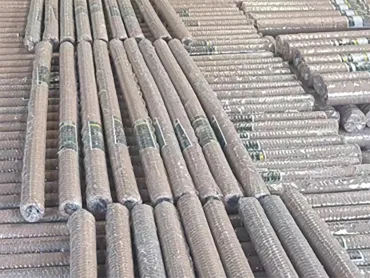Sep . 25, 2024 22:54 Back to list
field fencing wire
Field Fencing Wire Essential for Effective Agricultural Management
Field fencing wire plays a crucial role in modern agricultural practices, serving as an indispensable tool for livestock management and land preservation. Farmers and landowners around the globe rely on various types of fencing wire to protect their crops, manage livestock, and delineate property lines. With a wide array of options available, it's important to understand the different types of fencing wire and their unique benefits.
One of the primary purposes of field fencing wire is to contain livestock securely. Whether it's cattle, sheep, or horses, having a reliable fence is essential to prevent animals from wandering off into dangerous areas or damaging neighboring crops. High-tensile fencing wire is one of the most popular choices among farmers for this purpose. This type of wire is engineered to withstand significant tension, making it durable and less prone to sagging over time. Its ability to maintain its shape and strength ensures a longer lifespan compared to standard wire options.
In addition to livestock management, field fencing wire serves another significant function protecting crops from wildlife. Fields often attract deer, raccoons, and other animals that pose a threat to growing plants. A robust fencing system can effectively deter these unwelcome visitors. Barbed wire, while not as aesthetically pleasing, is a common choice for farmers located in areas with high wildlife activity. The sharp barbs discourage animals from attempting to breach the fence, thereby safeguarding the crops from potential damage.
field fencing wire

Selecting the right type of field fencing wire involves consideration of various factors such as the type of livestock, the terrain, and local wildlife. For areas with aggressive animals or rugged terrain, stronger wires, like woven wire or electric fencing, may be necessary. Electric fencing, in particular, has gained popularity for its effectiveness in keeping animals contained without the need for physical barriers. By delivering a mild shock, electric fences deter livestock from attempting to escape while remaining a safe option when properly installed.
Moreover, the installation of field fencing wire contributes to the overall management of the land. Good fencing practices help in rotational grazing, where livestock are moved from one pasture to another to promote healthy regrowth of grasses and prevent overgrazing. This sustainable practice not only benefits the livestock by providing fresh forage but also enhances soil quality and promotes biodiversity in the ecosystem.
Maintenance of fencing wire is equally important. Periodic inspections can help identify rust, damage, or sagging that might compromise the fence’s integrity. Regular maintenance ensures that the fencing remains effective over time, reducing the need for costly replacements and repairs.
In conclusion, field fencing wire is a pivotal component in effective agricultural management. Its various types cater to specific needs, whether for containing livestock or protecting crops from wildlife. By investing in quality fencing wire and adopting responsible maintenance practices, farmers can create a secure and productive environment, ultimately enhancing their agricultural output and sustainable land management efforts.
-
The Role of Field Wire Fence in Grassland Conservation
NewsJul.15,2025
-
Stainless Steel Razor Wire Durability in Coastal Environments
NewsJul.15,2025
-
Enhancing Home Security with Mesh Fences
NewsJul.15,2025
-
Diamond Mesh Wire for Small Animal Enclosures
NewsJul.15,2025
-
Common Wire Nail Tensile Strength Testing for Woodworking
NewsJul.15,2025
-
Barbed Wire Corrosion Resistance Galvanization Techniques
NewsJul.15,2025









